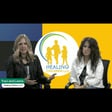Become a Creator today!Start creating today - Share your story with the world!
Start for free
00:00:00
00:00:01

Season Two/Episode Four: Finding Peace After Separation or Divorce
When marriages end, the path forward isn't just about legal proceedings—it's about rebuilding lives and preserving family bonds.
Amy Armstrong, certified parent coach and co-founder of the Center for Family Resolution, shares how mediation can transform the challenging journey of separation and divorce into an opportunity for positive change.
From protecting children's emotional well-being to managing high-conflict situations, this episode offers invaluable insights into:
- The role of professional mediators in family conflict resolution
- How mediation differs from traditional divorce proceedings
- Ways to maintain healthy family dynamics during separation
- The intersection of legal, emotional, and practical support in family mediation
- Cost-effective strategies for resolving family disputes
Whether you're considering separation, in the midst of divorce, or helping someone through this challenging time, this conversation provides important guidance for finding a peaceful path forward.
Transcript
Introduction to 'Guardians of Hope'
00:00:06
Speaker
Welcome to the Guardians of Hope podcast where we bring together parents, nonprofits, legal and medical experts dedicated to positively impacting children's lives. I'm your host, Cynthia Ramserin. The purpose of this podcast is to inform and unite. Please seek advice from your attorney or doctor to address your specific needs.
00:00:29
Speaker
The thoughts and opinions of my guests are not necessarily my own. So thank you all for joining and sharing.
Impact of Separation and Divorce on Families
00:00:38
Speaker
Welcome, everyone. Separation and divorce bring emotional and physical changes to families. When couples separate, they must plan for parenting their children, division of property, and future financial arrangements. These discussions can often be stressful and cause pain for everyone involved.
00:00:58
Speaker
It's hard to focus on the decisions when emotions run high, including anger, worry and grief, among other feelings.
Role of Mediation in Family Conflicts
00:01:06
Speaker
Mediation allows family members to resolve these conflicts during and after separation or divorce. Mediators are neutral professionals who help participants clearly define the issues in dispute, keep open communication lines,
00:01:23
Speaker
and promote rational discussions and acceptable agreements.
Interview with Amy Armstrong
00:01:27
Speaker
Joining me to discuss this is Amy Armstrong, a certified parent coach and co-founder of the Center for Family Resolution. Amy, thanks so much for joining us today. Thank you. I feel welcome.
00:01:41
Speaker
Excellent. Why don't you tell us about your background and what called qualifies you as a conflict resolution expert or specialist? Sure.
Amy Armstrong's Professional Journey
00:01:50
Speaker
Thank you. i I started off my career as a parent educator focusing on parenting skills and realized that very quickly, even though parents want to learn new skills and do better by their children, when the heat comes on and conflict starts to escalate, it's really hard to apply the skills. And so I was excited to have um a couple different opportunities to get training as a coach. And I loved it so much that I now have started my own coach education program with the International Coaching Federation. And what happened for me as a coach is I found that there
00:02:32
Speaker
could be a connection between the skills that parents need and know are right for their kids and really how to use them when the going gets tough. And so once I started working with parents as a coach, I had some yeah interaction with the court system through my own divorce. And I got to know some guardians at Lydom who were trying to help families when their parents were in the throes of all the emotion of separation and divorce. And they asked me if I would create a course for the courts to use to help parents know what do we really need to focus on during this sometimes dark transition time.
Court Courses and Coaching Practice
00:03:15
Speaker
And
00:03:17
Speaker
I loved doing the course. um we We use it countywide in our in our system. But what happened is this intersection between the skills and the coaching allowed me to start my practice where I could work with individual families to deal with exactly what their stressors were. Oftentimes it was communication.
00:03:39
Speaker
But what I found was that the old patterns that played out in the relationship that caused the end of the relationship were still going on even after they separated and divorced. So the big myth was that once you get divorced,
00:03:56
Speaker
You've moved on from that relationship it really just changes names right from lover or you know marital partner spouse to co-parent and the patterns actually continued so really bringing the parenting skills in a coaching context.
00:04:17
Speaker
gave me the idea to start a company, it's called the Center for Family Resolution, and we actually operate now a lot by court order.
Services Offered by the Center for Family Resolution
00:04:26
Speaker
So courts literally all over the US, primarily in Ohio, but all over, use us to require parents to work on their communication, to work on how they resolve conflict so that they don't keep going back to court and so that they can resolve their case much more quickly.
00:04:48
Speaker
Sounds great. Why don't you talk about some of the services that you provide? Yeah, sure. um Really, the first thing we do, which probably isn't what your listeners expect, but the first thing we do was help normalize the reactions that parents have in the heat of conflict. So a lot of parents feel so much um Maybe like they failed or really feeling shame because they've had really big reactions. They've gotten into some big arguments Maybe there's even been violence in their family and they know they can do better, but they don't know how
00:05:25
Speaker
So we normalize, first off, how the brain works, how our nervous systems work, how anxiety and fear can get the best of us. So that's a really big piece. It's just helping people go easier on themselves ah and set realistic expectations of what they're gonna need to do in order to handle their conflict well. So once we do that, we help them decide, do they need mediation? Do they need coaching?
00:05:53
Speaker
Or we have some specialized services such as parenting coordination, which is a court appointment that allows the parents to go to someone even after their court case has closed to get help implementing their parenting plan and address new issues that have come up.
00:06:14
Speaker
Excellent.
Funding and Early Conflict Resolution
00:06:15
Speaker
So you mentioned that it's sometimes court appointed or not. um Can you tell me how the process works? Who would were you um who pays for the services and all of those details? Yeah, thank you. Great questions. So our dream is that people call us first and we help them figure out what they need legal advice on and what they just need emotional support with.
00:06:43
Speaker
We want to save people money, we want to save them time and energy, and not necessarily use the court to help resolve their problems. So we do get court orders once people find out about us and they're already in court. So a lot of times their attorneys, their guardian ad litem, or the magistrate or judge will say, you know what, you guys are hurting, you're not moving through this in a very smooth way. Let's get you some help.
00:07:14
Speaker
And so the more people know about us, the more likely, right, the attorneys or court are willing to say, let's stop the litigation for a hot minute and see if we can get you the right help. But truly, our desire is to get the word out that when people come to us earlier, then they're coming into a mode, a mindset of resolution and finding the skills they need early on.
00:07:44
Speaker
to keep the conflict from escalating. But once they're in court, once it does become a court order, we actually help with the language of what needs to go in the court order so that we know who's paying for it, how they're paying for it, um when, how often they're going to meet, how they're going to know when they're through the process. It is private pay most of the time. So I personally have the luxury of working inside the court in one county in Ohio in Delaware County, and the court actually pays me to provide the service, so it's completely free for the moms and dads. But most of the time, unless courts have a specialized program, the moms and dads are paying for it directly. And sometimes we can use a sliding scale, but we're really looking at about $175 an hour for an individual session, and then it reduces down to $125 an hour
00:08:40
Speaker
per person for a joint session. So insurance does not cover this. Maybe someday it will. I know that we've made progress in some areas of coaching where insurance is starting to pay for it. But in the Behavioral Health Arena right now coaching is not covered by insurance so it is private pay and we often do parenting help with parenting plans with a payment plan in place just to help families that
00:09:13
Speaker
you know, may not have access to the resources to get it paid up front. And our hope, in all being very candid here, our hope is that people see that they can allocate some of the resources that would otherwise go to attorneys to really getting the help that's going to fix the problem from the root.
00:09:35
Speaker
That's exactly what I was thinking. Attorney costs can be triple what you're charging. So mediation may be the first way to go.
Children's Roles in Mediation
00:09:45
Speaker
yeah you know So I wanted to bring this conversation back to kids and you know how this affects them. My question for you is how much do children get involved in the mediation process and how are they involved in general?
00:10:00
Speaker
That is a great question. There's a big myth in the family law arena that children should get to choose the parenting time schedule or which parent they're with, at least once they reach a certain age. And the reason I call that a myth is that as much as we want to hear the child's voice and understand their needs and understand the impact that each parent has on them,
00:10:27
Speaker
we don't like to see children taking on the burden of adult decisions. It's too much responsibility for them and there's too many factors at play that they simply don't have access to that information.
00:10:40
Speaker
So we definitely want to get the children's voice in early and often, and sometimes that comes through their teacher, often that comes through a therapist or someone that knows them well, and of course through the parents. It's just that oftentimes in high conflict especially, the parents have different ideas about what the child needs and wants. So we like to talk to the children directly when we can, as long as that child understands that they are not the decision maker and that we're just learning, we want to get to know them.
00:11:16
Speaker
And we really want to hear what's important to them. And then the adults are all going to put our heads together to figure out what's best for the child. And that's really where the guardian comes in a lot. In Ohio, we call them guardiansed litem. They're different names in different parts of the country. But this is the person to really talk with the child repeatedly, see them in both homes, get to see what's missing or what strengths they have in either home, and make sure that the agreements and decisions that are ultimately made in that family fit the needs of the child. Okay. Amy, thank you. I have one more question for you. You know that there are advantages and disadvantages to everything.
Empowerment Through Mediation
00:12:00
Speaker
Why can mediation be a better option for families? I know you discussed a couple of things, but in general,
00:12:07
Speaker
which What are your thoughts? It simply helps people take charge of their life. People don't know what choices they have. And in mediation, especially with a coach approach, they can get clear on their needs, clear on their goals and clear on their options so that they can make very educated decisions. And we make sure in mediation,
00:12:33
Speaker
that any time they need legal advice because of course the law matters and we want them to know what their rights are as well as what makes sense to them and what their preferences are. And so we always work with their attorneys if they have them or we make sure that we point folks to the right resources when they have legal you know, issues that they maybe not don't even realize that they're missing out on some legal information that they need in order to be fully informed. But we want people to feel empowered. And the way we're set up at the Center for Family Resolution is we have
00:13:13
Speaker
any different configuration. We can meet with people separately. We can make sure that each person has their own coach, and then we come together all four of us. Sometimes we do shuttle style where the people never talk directly to each other, but we go back and forth. So we want to make sure that we're working with people in the way that they feel the most empowered to get clear, to learn about themselves, learn about their options, and ultimately make the decisions that are right for their family.
00:13:43
Speaker
Amy, thank you. Can you tell us more about where we can learn more information about you?
Amy Armstrong's Books and Social Media Presence
00:13:49
Speaker
I know you have a book that might be helpful. I actually wanted a book that outlined some very clear basic parenting skills, and I couldn't find one that I loved. So I wrote one myself with a couple of colleagues, and it's called Realtime Parenting. It was published in 21. I'm just finishing up a book now called Mastering Boundaries.
00:14:13
Speaker
And it's a beautiful way to learn how to be true to your values and claim your power to resolve conflict. I do TikTok videos for co-parents every day and I can be found on TikTok at Amy Armstrong Conflict Free.
00:14:31
Speaker
And then I also have Instagram accounts, Facebook accounts, of course, and I love for business folks to find me on LinkedIn. I do lots of speaking and work with courts. Matter of fact, in a couple of hours, I'm going to be on a call with 50 judges from around the state, helping them understand some of the processes that we can do to help folks implement their parenting plans.
00:14:54
Speaker
You're a very busy lady. I am. I love it. I do. Good for you. Thank you so much, Amy. Thank you for having me.



















